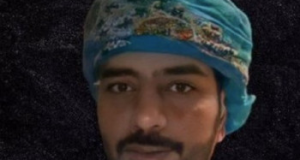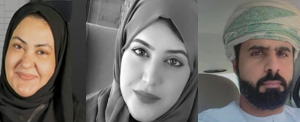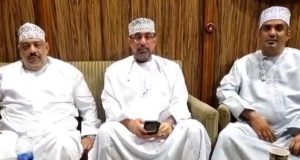Local reports confirmed that the trial in Oman of writer and civil society activist Musallam Al-Ma’ashani has been postponed indefinitely due to the spread of novel coronavirus (COVID-19). He was released on 25 April 2020, with a bail of 3,000 OMR ($7,800).
A letter issued by the Public Prosecution in Salalah on 12 March 2020 had asked Al-Ma’ashani to appear before the Court of Appeal in Salalah on 06 April 2020 to start the first hearing in the trial of the case No. 25715 of 2019.
On 14 November 2019, security forces arrested Al-Ma’ashani at the Sarafit border crossing with Yemen while he was returning to his home country Oman. He was transferred to Arzat Central Prison in Salalah, Dhofar Governorate where he was prevented from seeing a lawyer and was denied access to medications for his eye as well as allergies, which he needs to take daily.
He started a hunger strike as soon as the authorities imprisoned him, as it was discovered that his detention was linked to his documentation of the events of the Al-Hakali meeting place.
He was previously taken to court in 2013 after publishing a book entitled “Dhofar: The Diary of February 25.” Although he did not print or distribute it in Oman, he was tried for his book, which includes three chapters on the 2011 mass popular protests in Salalah, which resulted in a large-scale campaign of arrests. The book documents the events during the protests in pictures.
In a hearing held on 29 May 2013, the Salalah Court of First Instance sentenced Al-Ma’ashani to prison on two charges: distributing publications without a license, and writing publications that incite hatred and spread discord among members of society. The court sentenced him for the first charge to five months’ imprisonment and a fine of 500 Omani Rials (US$1,300), and for the second charge to six months’ imprisonment and a fine of 500 Omani Rials. The two sentences were combined and the heaviest was imposed. The prison sentence was reduced to just two months with a bail of 500 Omani Rials and his publications were ordered to be confiscated.
Al-Ma’ashani is a well-known writer and 60-year-old civil society activist. He is known for his demands to protect public freedoms in Oman, including freedom of opinion and expression and freedom of peaceful assembly.
The Gulf Centre for Human Rights (GCHR) and the Omani Association for Human Rights (OAHR) welcome the release of writer and activist Musallam Al-Ma’ashani, and the postponement of his trial, but condemn his arrest, as well as the unfair charges made against him, in violation of his right to freedom of expression.
GCHR and OAHR urge the authorities in Oman to:
Drop all the charges against Musallam Al-Ma’ashani immediately without any conditions;
Stop targeting Musallam Al-Ma’ashani, who has been charged in violation of his right to free expression; and
Guarantee in all circumstances that all human rights defenders in Oman are able to carry out their legitimate human rights activities without fear of reprisals and free of all restrictions including judicial harassment.
GCHR and OAHR respectfully remind the Omani authorities that the United Nations Declaration on the Right and Responsibility of Individuals, Groups and Organs of Society to Promote and Protect Universally Recognized Human Rights and Fundamental Freedoms, adopted by consensus by the UN General Assembly on 9 December 1998, recognizes the legitimacy of the activities of human rights defenders, their right to freedom of association and to carry out their activities without fear of reprisals. We would particularly draw your attention to Article 6 (c): “Everyone has the right, individually and in association with others: (c) To study, discuss, form and hold opinions on the observance, both in law and in practice, of all human rights and fundamental freedoms and, through these and other appropriate means, to draw public attention to those matters;” and to Article 12.2, which provides that “the State shall take all necessary measures to ensure the protection by the competent authorities of everyone, individually and in
 Omani Association for Human Rights
Omani Association for Human Rights


